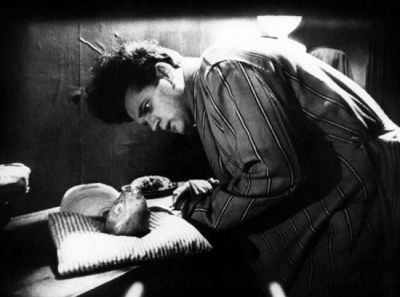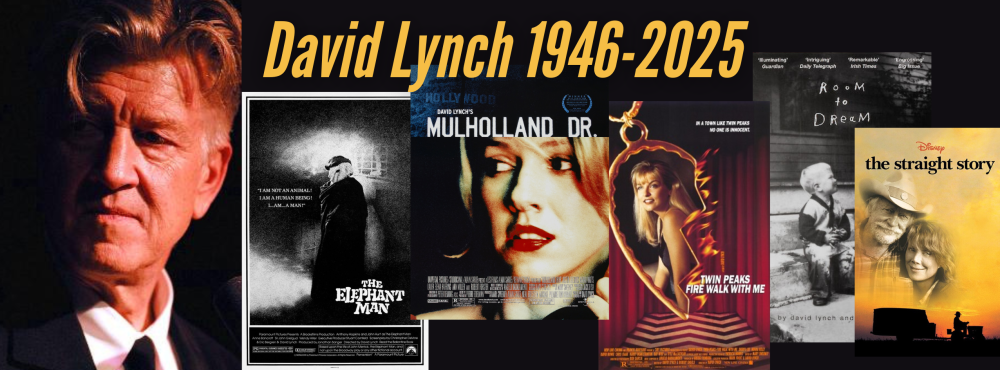Celebrating the life and art of David Lynch | 1946-2025
The worlds of American cinema and visual art mourn the passing of director and painter David Lynch. Perhaps best known for the Twin Peaks television series (1990-1992), Lynch directed ten feature films, dozens of short films, commercials, and music videos.

Lynch's first full-length film Eraserhead appeared in 1977. It established Lynch's signature mix of dark surrealism and dreamlike atmosphere. It also set the creative framework that Lynch would exist in throughout his career, having a hand in art direction, sound design, and music composition, in addition to writing and directing.
His first commercial success came with The Elephant Man in 1980, which featured Anne Bancroft, Anthony Hopkins, Sir John Gielgud, and John Hurt in the title role. The dark tragedy of the film never loses its tenderness. This play of light and dark was a signature element that would shine through again and again in Lynch's films.
He learned a lesson in creative control in the production of Dune (1984). An elaborate box-office failure, Lynch felt it was a creative failure as well as he was pressured to relinquish many major decisions for the film to its producers, including his own approval for the final cut with regard to editing. The struggle is lovingly covered by David Foster Wallace in his essay "David Lynch Keeps His Head," available Wallace's essay collection A Supposedly Fun Thing I'll Never Do Again, which also has this brilliant summation of the artist's work:
"WHAT ‘LYNCHIAN’ MEANS AND WHY IT’S IMPORTANT
"AN ACADEMIC DEFINITION of Lynchian might be that the term “refers to a particular kind of irony where the very macabre and the very mundane combine in such a way as to reveal the former’s perpetual containment within the latter.” But like postmodern or pornographic, Lynchian is one of those Porter Stewart-type words that’s ultimately definable only ostensively-i.e., we know it when we see it.
"A recent homicide in Boston, in which the deacon of a South Shore church reportedly gave chase to a vehicle that bad cut him off, forced the car off the road, and shot the driver with a highpowered crossbow, was borderline Lynchian. A Rotary luncheon where everybody’s got a comb-over and a polyester sport coat and is eating bland Rotarian chicken and exchanging Republican platitudes with heartfelt sincerity and yet all are either amputees or neurologically damaged or both would be more Lynchian than not."

Lynch's later work is best represented by the unofficial "trilogy" of Lost Highway (1997), Mulholland Drive (2001), and Inland Empire (2006). At turns campy, creepy, and occasionally confusing, the films are great thrill rides that will resonate in your head.
You can get to know the artist in his own words in the collaborative biography Room to Dream with Kristine McKenna. He explores his painting, and its importance to the whole of his creativity in the intimate documentary David Lynch: The Art Life by by Jon Nguyen, Rick Barnes, and Olivia Neergaard-Holm. His own book Catching the Big Fish explores another key facet to his process - his transcendental meditation practice - and you can read or hear the book in the author's voice on Libby.
Other works by David Lynch in our collection:
Blue Velvet (1986): The director solidified his own proto-film noir style in this early classic with recurring Lynch stars Kyle McLachlan (Dune, Twin Peaks), Laura Dern (Wild at Heart) and Grace Zabriskie (Twin Peaks), as well as Dennis Hopper, Willem Dafoe, and Dean Stockwell.
The Straight Story (1999): a full departure from the eerieness of the director's best-known work, this Disney film follows a 73-year-old man who makes a 200-mile journey on his riding lawnmower to reconcile with his ailing brother.
Twin Peaks: Fire Walk With Me (1992): The feature-length theatrical prequel to the groundbreaking television series. See if you can catch Lynch's rare vocal contribution in the soundtrack!

